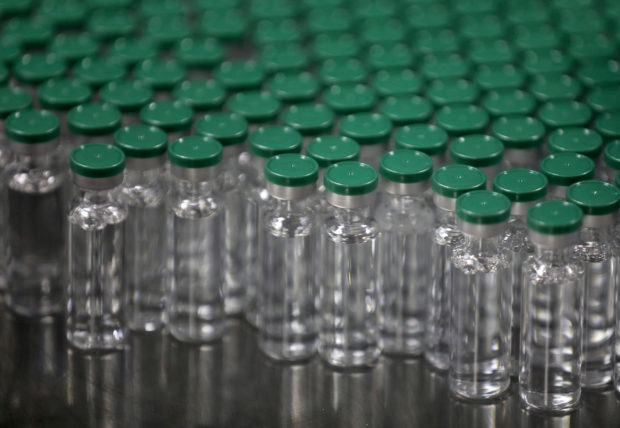AstraZeneca to test combining COVID-19 vaccine with Russian shot

FILE PHOTO: Vials of AstraZeneca’s COVISHIELD, coronavirus disease (COVID-19) vaccine, are seen before they are packaged inside a lab at Serum Institute of India, Pune, India, November 30, 2020. REUTERS/Francis Mascarenhas/File Photo
AstraZeneca will start clinical trials to test a combination of its experimental COVID-19 vaccine with Russia’s Sputnik V shot aimed at boosting the efficacy of the British drugmaker’s vaccine, Russia’s sovereign wealth fund said on Friday.
Trials will start by the end of the year, said the RDIF wealth fund, which has funded Sputnik V, named after the Soviet-era satellite that triggered the space race.
In a statement on Friday, AstraZeneca said it was considering how it could assess combinations of different vaccines, and would soon begin exploring with Russia’s Gamaleya Institute, which developed Sputnik V, whether two common cold virus-based vaccines could be successfully combined.
It did not give further details.
The co-operation between one of Britain’s most valuable listed companies and the state-backed Russian science research institute highlights the pressure to develop an effective shot to fight the pandemic that has killed over 1.5 million people.
Article continues after this advertisementThe move is likely to be seen in Moscow as a long-awaited vote of confidence by a Western manufacturer in Sputnik V.
Article continues after this advertisementIts Russian developers say clinical trials, still underway, have shown it has an efficacy rate of over 90%, higher than AstraZeneca’s own vaccine and similar to U.S. rivals Pfizer and Moderna.
Some Western scientists have raised concerns about the speed at which Russia has worked, giving the regulatory go-ahead for its vaccines and launching large-scale vaccinations with Sputnik V before full trials to test its safety and efficacy have been completed.
The prospective tie-up comes as AstraZeneca, once seen as a frontrunner in the vaccine race, prepares for further tests to confirm whether its shot could be 90% effective, potentially slowing its rollout.
The average efficacy rate was 70.4% in interim late-stage data.
Both projects are using harmless adenoviruses as vehicles to bring genetic instructions into the body to prompt cells to produce vaccine proteins, an approach that has previously been used in an Ebola vaccine.
The developers of Sputnik V suggested on Twitter last month that AstraZeneca try the combination.
“The decision by AstraZeneca to carry out clinical trials using one of two vectors of Sputnik V in order to increase its own vaccine’s efficacy is an important step towards uniting efforts in the fight against the pandemic,” said RDIF head Kirill Dmitriev in a statement.
The partnership may draw scrutiny after Britain said in July hackers backed by the Russian state were trying to steal COVID-19 vaccine and treatment research from academic and pharmaceutical institutions around the world. The Kremlin rejected the Western allegations.
The news came as Sanofi and GlaxoSmithKline said clinical trials of their COVID-19 vaccine showed an insufficient immune response in older people.